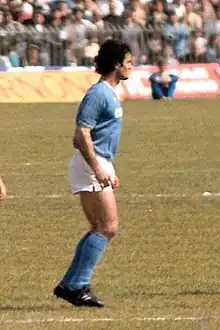Giuseppe Bruscolotti
Giuseppe Bruscolotti (born 1 June 1951) is a former Italian footballer who played as a right-back. He is mostly remembered for his lengthy spell with S.S.C. Napoli, where he served as the club's captain and contributed to the team's first ever Serie A title in 1987. Throughout his career, he was referred to as "Pal e fierr" ("iron pole") by the fans, due to his physical strength.[3]
 | |||
| Personal information | |||
|---|---|---|---|
| Full name | Giuseppe Bruscolotti | ||
| Date of birth | 1 June 1951 | ||
| Place of birth | Sassano, Campania, Italy | ||
| Height | 1.81 m (5 ft 11 in) | ||
| Position(s) | Right-back | ||
| Senior career* | |||
| Years | Team | Apps | (Gls) |
| 1970–1972 | Sorrento[1] | 60 | (1) |
| 1972–1988 | Napoli[2] | 387 | (9) |
| Total | 447 | (10) | |
| *Club domestic league appearances and goals | |||
Career
Born in Sassano, Campania, Bruscolotti began his career with Sorrento in 1970. He immediately helped the club to Serie B promotion, winning the Serie C1 title during the 1970–71 season, and was a part of a defence which only conceded 12 goals in the league; the following season, however, the club were immediately relegated to Serie C once again, after finishing in second-last place in the league.[4]
Bruscolotti subsequently moved to S.S.C. Napoli in 1972, where he spent most of his career, making over 500 appearances for the team during his sixteen seasons in Naples; he made his Serie A debut with Napoli during the 1972–73 season, in a 1–0 win over Ternana on 24 September 1972. Bruscolotti became a symbol and a legend of the club, and played a key role in helping Napoli to their first ever Serie A title in 1987; he was also the team's captain from 1978 until 1984, when he handed over the armband to Diego Maradona.[5] He retired at the age of 37 in 1988;[3][6] he holds the record for most Serie A appearances for Napoli (387), and has made the second most appearances in all league competitions for the club.[7] He also made 96 appearances for Napoli in the Coppa Italia, and 28 in European competitions. Bruscolotti also scored 11 goals for Napoli throughout his career; one of his most notable goals came in a 1–0 home victory over Anderlecht in the return leg of the 1976–77 European Cup Winners' Cup semi-finals, although Napoli were eliminated by the eventual champions on aggregate.[6] His most important goal for the club came in the second leg of the 1976 Anglo-Italian League Cup final, which saw Napoli triumph over Southampton.[8] In addition to these titles, Bruscolotti also won two Coppa Italia titles with Napoli.[3][6][9][10]
Style of play
A tenacious, imposing, and powerful full-back, Bruscolotti was known in particular for his physical strength and balance, as well as his excellent man-marking ability, leadership, and his hard-tackling style of play.[3][6] Although he was notorious for his aggressive challenges, he was also praised throughout his career for his fair-play attitude.[11]
Honours
References
- FootballPlus.com
- Bruscolotti Archived 2008-10-03 at the Wayback Machine
- "Giuseppe Bruscolotti" (in Italian). quicampania.it. Retrieved 7 April 2016.
- "La prima del Sorrento sulle rive del Lario" (in Italian). Il Giorno. 11 October 2009. Retrieved 7 April 2016.
- Nicola Sellitti (9 February 2016). "Bruscolotti, una vita in azzurro: "Napoli, ricorda quella partita dell'86"". La Repubblica (in Italian). Retrieved 7 April 2016.
- Leonardo Ciccarelli (24 October 2012). "La storia siete voi: "Pal 'e fierro" Bruscolotti" (in Italian). Tutto Napoli. Retrieved 9 April 2016.
- "Napoli Player Statistics". ClubAngloNapulitano. Retrieved 1 August 2007.
- "I PRECEDENTI DEL NAPOLI CON LE INGLESI" (in Italian). Pianeta Napoli. 11 March 2012. Retrieved 9 April 2016.
- "Coppa Italia 1975/76 - La Finale" (in Italian). hellastory.net. Retrieved 9 April 2016.
- Mimmo Carratelli (8 February 2012). "Il Napoli e una Coppa Italia che non ha mai onorato granché" (in Italian). ilnapolista.it. Retrieved 9 April 2016.
- Maurizio Cortese (11 March 2016). "Bruscolotti, "pal'e fierro" ma sempre leale. Gigi Riva lo paragonò a Berti Vogts" (in Italian). ilnapolista.it. Retrieved 9 April 2016.